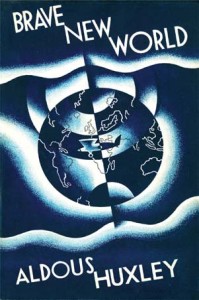Aldous Huxley: When an author is just too successful
The future seems to have converged on Aldous Huxley’s once brave predictions…
 Rooting around for a new audio book recently to listen to on my daily commute – as there are only so many Bryant and May novels I can fill my days with – I decided to give Aldous Huxley’s Brave New World a try.
Rooting around for a new audio book recently to listen to on my daily commute – as there are only so many Bryant and May novels I can fill my days with – I decided to give Aldous Huxley’s Brave New World a try.
I remember reading it years ago. Or rather, I’m sure I must have read it years ago as there’s a copy on my bookshelf and I’m as likely to put an unread book on my shelves as I am to remove a book from my shelves and bin it. I trust my filing system over my memory.
A classic science-fiction novel, regularly rated one of the best English novels of all time? That’ll do nicely.
But then I started listening to it and found it remarkably plodding. Turgid rather than elegantly slow moving. Now, I know that in the linguistic analysis scales, if I’m not keen on Huxley, you should bet on Huxley being right and my tastes being flawed. Even I would. But what was it that didn’t work for me, 83 years after he wrote his masterpiece?
It is that he slowly, elegantly and in detail describes a vision of the future that was at the time shocking but now is common place. Partly because the world has moved towards the future he predicted – with genetic engineering and training of our instinctive mind the stuff of medical reality. Partly also because the sorts of dystopian future he depicts are now utterly common-place in any mediocre, middle of the road, special effects extravaganza Hollywood science fiction movie that comes and goes with barely a moment’s notice.
Of course it is to Huxley’s credit in large part that his vision of the future is so commonplace. It was so well thought through than 83 years on it still resonates, and so popular that 83 years on 1,001 others have copied it in its various ways. Just as with Tolkien, the novelty of Huxley’s writing is hidden under the numerous subsequent and inferior imitations. Orcs and programmable babies were both once novel.
It’s a remarkable achievement to have painted a picture of the future so long ago that it still works today as anything other than an anachronistic oddity. All the more so to have written it before the advent of computers or modern genetic engineering and yet to have captured many of their impacts so well. And it would be sacrilege to suggest anyone could edit it into a better, pacier novel.
But at least please forgive me if I only pay half-attention through the long descriptive passages as I find my way once again between the Victoria and Jubilee Lines.
Leave a Reply